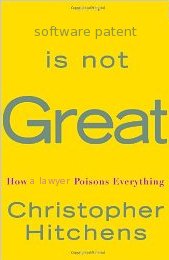Litigation is Ruining Science, Technology
- Dr. Roy Schestowitz
- 2010-11-15 18:15:05 UTC
- Modified: 2010-11-15 18:15:05 UTC

Summary: Linspire case ends up with very high legal expenses and this leads to a discussion which can be generalised to account for patent litigation
SWEEPING statements are risky as they contribute towards alienation and sometimes elimination of friends (or potential friends) and controversial topics are rarely brought up as they too are divisive. But for readers of this site who are patent lawyers and have stayed with us thus far, the twist above (around Christopher Hitchens's book) will probably not be a shocker.
Techrights has claimed on nearly thousands of occasions and in about 100 posts that inertia for the broken (overburdened) patent system comes from patent lawyers, who benefit directly from increased bureaucracy and "lawyer time" (pay is usually clocked). The more messy the system, the more such lawyers (patent lawyers in particular) will be required and the more money they will extract from people who actually create things of value to society.
The reason we bring this up again is that there's news from
Linspire and it's another episode in the drama of litigation [
1,
2,
3], where Michael Robertson (head of Linspire/Lindows) is
forced to pay $300,000+ to a former employee. Now, watch where most of this money is going:
For those of you following the case of Michael Robertson's insane attacks on former Linspire employees, you will be interested in the latest development from the court today...
One of the former Linspire employees that Robertson attacked was the Controller. This employee (along with several others) was vindicated of all counts in September. Because the Controller had a contract dispute with Robertson, attorney fees are usually awarded, but of course Robertson fought paying. Today, the court awarded the Controller and his lawyer $215,000 in legal fees and $22,958 in prejudgement interest. The Judge also affirmed the jury's damages judgement of $72,500, to be paid by Robertson (Linspire) to the Controller. This means that Robertson will have to pay over $300,000 to just this one employee for his failed attempts in attacking him in the courts. You can read the ruling here. (This is the tentative ruling which was affirmed in court today by Judge Taylor.)
We thought it was a good example of how this sick legal system operates. It's a system which puts financial burden on those involved, including companies that are accused of patent litigation. In this case, Linspire helps make lawyers richer and thus stronger (e.g. in lobbying). In such cases, the lawyers have nothing to lose, only their clients do. Someone should pass this message/memo to
the likes of Judge Rader, who still fails to acknowledge that this is a major problem when it comes to patents too. Let's work on improving science and expanding the scope of knowledge rather than suing each other. Many disputes can be resolved outside the courts and elimination of weaponry like patents would help increase productivity. Just watch what the Cold War did to the Soviets (and to a lesser degree to the United States). They could produce a lot of warheads (enriching the Military Industrial Complex, analogous to houndish -- trigger-happy lawyers), but could not take good care of their own population.
⬆
"In the 20th century, the pace of technological developments increasingly became tied into a complex set of interactions between Congress, the industrial manufacturers, university research, and the military establishment. This set of relations, known more popularly as the "military-industrial complex," emerged because the military's unique technological demands, concentration of funding, large scale application, and highly centralized control played a dominant role in driving technological innovation. Fundamental advances in medicine, physics, chemistry, computing, aviation, material science, naval architecture, and meteorology, among other fields, can be traced back to basic and applied research for military applications." --
Wikipedia
